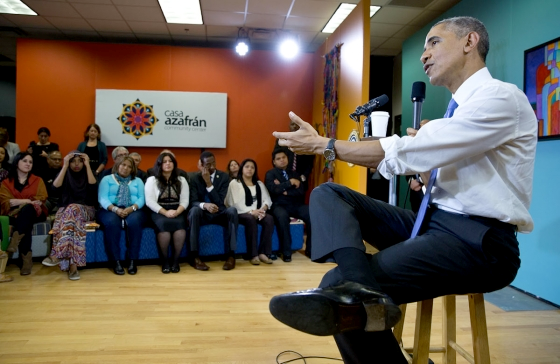White House embraces a Southern-grown movement to integrate immigrants

President Obama spoke at an immigration town hall last December in Nashville, Tennessee, where a movement to welcome new Americans got its start. (Image is a still from a White House video.)
This week, the White House Task Force on New Americans announced a nationwide strategy to improve the integration of new immigrants into local communities.
Among the major goals raised by the new task force, which was created last November as part of President Obama's executive action on immigration, is building "welcoming" communities, an innovative approach that got its start in the South nearly a decade ago.
"Recognizing that integration is a two-way process that occurs primarily at the local level, the Task Force will support initiatives that build bridges among immigrant and receiving communities," the task force's report outlining the new plan states.
That language draws on an approach spearheaded by Welcoming America, an Atlanta-based national organization that works to build a supportive climate for new immigrants among business, political and civic leaders in the "receiving community" where newcomers are taking root. By winning over key stakeholders in the community, welcoming initiatives have sought to both boost local support for new immigrants as well as to help curb the anti-immigrant backlash that sometimes follows their arrival.
The welcoming movement got its start in Nashville, Tennessee in 2006 as a project called Welcoming Tennessee, led by the Tennessee Immigrant and Refugee Rights Coalition (TIRRC). Like many other Southern states, Tennessee was in the midst of rapid demographic change marked by growing immigrant communities. Between 2000 and 2011, eight of the 10 states with the fastest-growing Hispanic populations were in the South, including Tennessee, which saw a 154 percent increase. The Asian population in the state also grew by 65 percent during that time.
These changes prompted a backlash against new immigrants. Nativist groups gained attention, and a mosque outside of Nashville was burned. Anti-immigrant legislation was introduced, including an English-only measure for government documents in Nashville that was ultimately vetoed by the mayor.
"It was very clear what the model was for driving immigrants out," Welcoming America's Deputy Director Rachel Peric told Facing South. "But it took some time to develop a model if we wanted to respond in a different way."
Inspired by an initiative in Iowa, the Welcoming Tennessee project began creating opportunities for residents and immigrants to meet and build relationships and working with local leaders to spread positive messages about the social, economic and civic contributions immigrants make to the community. As the movement gained momentum, coalitions formed to defeat local anti-immigrant legislation, and opinion polls in Tennessee found changing attitudes towards immigrants.
In recent years, Nashville has enjoyed an economic resurgence and led the country in job growth in 2012. The city has become a magnet for young people as well as immigrants from around the world. Last fall, Nashville Mayor Karl Dean opened the Mayor's Office of New Americans to lead the city's immigrant integration initiatives. According to Peric, local civic and business leaders have recognized the importance of becoming a more welcoming community in the city's economic turnaround.
As the welcoming model gained momentum in other cities across the South and the country, Welcoming Tennessee developed into a national organization, Welcoming America, in 2009. It now has 18 statewide affiliates, including Alabama and North Carolina, and 52 localities participating in their Welcoming Cities and Counties program. In the South, participating localities include major cities like Atlanta and Charlotte, as well as smaller municipalities like High Point, North Carolina and Norcross, Georgia.
Shortly after announcing his executive actions on immigration last November, President Obama visited Nashville to meet with leaders from TIRRC and Welcoming America and to recognize the movement's achievements locally and nationwide. With the recent release of the task force's recommendations, Peric is enthusiastic about the emphasis being put on immigrant integration.
"There has been a lot of attention on immigration issues but less attention on a holistic way of thinking about what happens to immigrants when they get to communities and whether they are welcomed and supported to reach their fullest potential," Peric said.
Now, with the backing of the White House, the welcoming movement is poised to spread even further around the country.
Tags
Allie Yee
Allie is a research fellow at the Institute for Southern Studies and is currently studying at the Yale School of Management. Her research focuses on demographic change, immigration, voting and civic engagement.
